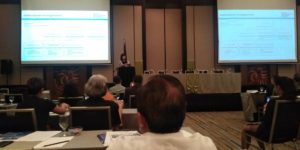
Yuko Okazawa, an urban specialist from the Tokyo Development Learning Center (TDLC) of the World Bank, discusses options on how Metro Cebu can solve its urban problems during an Oct. 30 forum in Cebu City. CDN PHOTO/DELTA DYRECKA LETIGIO
JAPANESE companies are looking into Cebu’s sewage treatment and garbage management sector as a possible area to invest into next year.
Representatives from Yokohama City-based companies such as Amcon, Takematsu Shoji Co., Ltd. and Hinode Sangyo have shown interest in investing into the sector during a recent forum in Cebu City.
Gordon Alan Joseph, Metro Cebu Development Coordinating Board co-chairman, welcomed the possible investments during the Metro Cebu Urban Development Forum on Oct. 30 in Cebu City.
Joseph said waste water management would be the utility that Metro Cebu would have to develop since it would affect much of the industries in Metro Cebu.
Jefferson Benedicto, senior community relations officer of the Metro Cebu Water District (MCWD), also welcomed the investors’ interest in the sector.
Benedicto said that the lone fully-mechanized dislodgement and water treatment facility in Cordova town was not enough to maintain the waters in Metro Cebu.
“We saw the need to upgrade our existing facilities since its capacity cannot sustain the entire city,” said Benedicto.
He is hoping for the facility in Cebu City managed with Amcon to be accredited by the Department of Environment and Natural Resources (DENR) for it to be fully functional.
“The facility near SM City is treating our waters but it is not absolute. The water is still not safe to discharge back to the waterways,” Benedicto said.
Guun Co Ltd., a Yokohama-based waste management company, is also planning to provide an additional water treatment facility and invest in conducting garbage segregation focusing on waste public disposal in Metro Cebu.
Joseph said that these investments would help address Metro Cebu’s waste management problems, which would affect the rest of the local industries including the tourism industry as these investments would also mean cleaner beaches and seas.
Japanese experts
Aside from the waste management sector, Japanese urban specialists from Yokohama City discussed during the forum ways on how to solve Metro Cebu’s urban problems such as traffic, wastewater management, and housing, which used to be the problems of Yokohama City in the past.
Yuko Okazawa, an urban specialist from the Tokyo Development Learning Center (TDLC) of the World Bank, said that Metro Cebu is not a hopeless case and by shifting the vision of the entire city into one goal owned by the citizens, developmental projects can go beyond mayoral terms and can last half a decade the way it did for Yokohama.
“The simple story of the projects came into one and they (Yokohama officials) made sure it was owned by the people. It is critical that the citizens become the governors of this vision,” said Okazawa.
Proposed strategy
Okazawa proposed a strategy to the Metro Cebu Development Coordinating Board (MCDCB) which includes using selective project-based approach, using clear long-term vision with flexible approaches, working on cross-sectoral coordination, and pushing for community-based movements.
She added that Yokohama City is eager to be in partnership with Metro Cebu for development and help through sharing of knowledge and resources.
“If Yokohama can do it, why can’t we?” said Joseph, co-chairman of MCDCB.
Joseph said it would be high time for Metro Cebu to solve the problems brought by population densification and learn from the best practices of Yokohama.
“The time is now, we cannot wait any longer. With Yokohama’s knowledge and experience and everything they impart, we will be foolish not to adopt what they are sharing with us,” said Joseph.